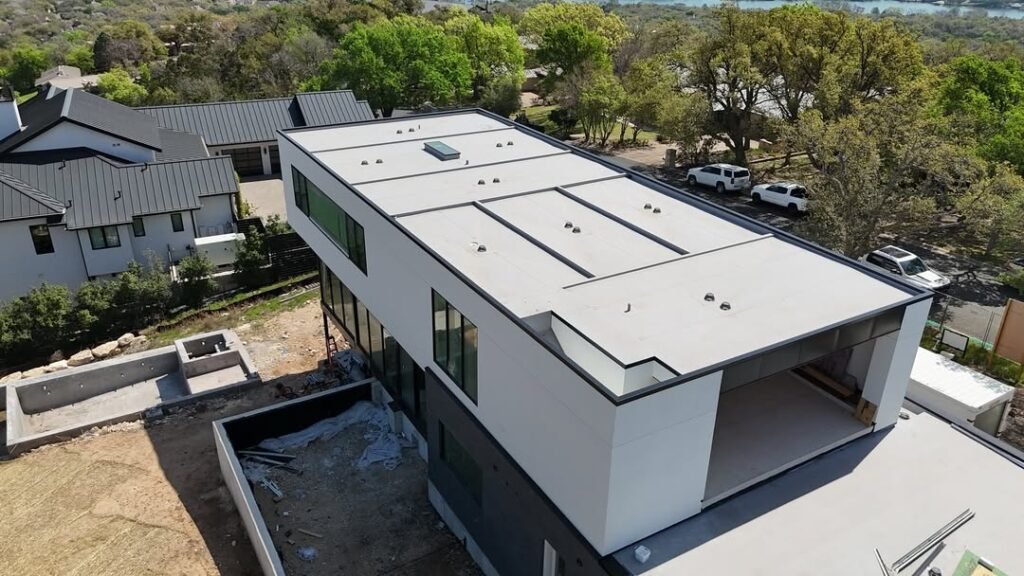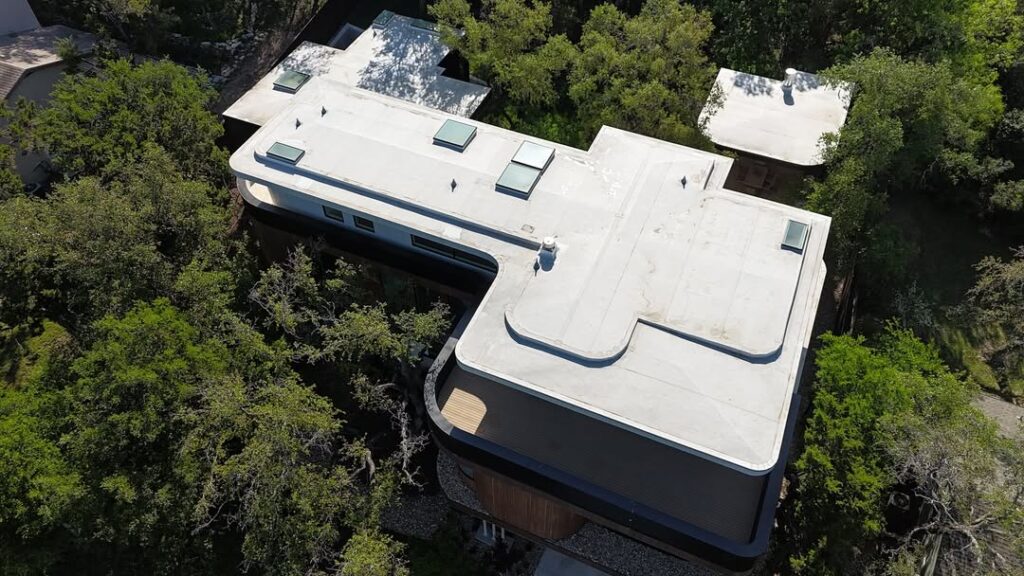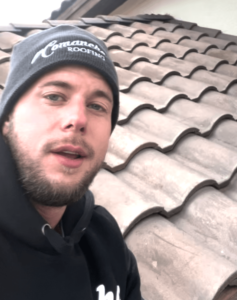What Is Flat Roofing? A Complete 2025 Homeowner’s Guide

If you’re exploring roofing options for your home, you’ve likely come across the term flat roofing. Traditionally seen on commercial buildings, flat roofs are quickly becoming a favorite among homeowners—especially in modern neighborhoods around Austin, TX. Whether you’re building a new home, planning a renovation, or replacing an old roof, this comprehensive guide will help you understand what flat roofing is, its benefits, common materials, costs, and maintenance tips.
Table of Contents
ToggleWhat Exactly Is a Flat Roof?
Despite the name, flat roofs are not perfectly flat. They have a very low slope—usually between 1/4 inch to 1/2 inch per foot—that allows water to drain off the surface. The design appears flat from the street but includes a subtle incline that directs rainwater to drains or gutters, preventing pooling and water damage.
Flat roofs are widely used on modern homes, multi-family buildings, and commercial properties. They’re valued for their simplicity, affordability, and the possibility of adding functional outdoor spaces like rooftop gardens, patios, or solar panel systems.
Why Are Flat Roofs Gaining Popularity Among Homeowners?
1. Modern, Clean Aesthetic
Flat roofs contribute to a sleek, contemporary look that pairs well with modern architecture. Clean lines, minimalist profiles, and expansive surfaces are key design features for today’s new homes.
2. Additional Usable Space
Unlike pitched roofs, flat roofs offer practical outdoor space. You can create:
- A rooftop lounge or garden
- An outdoor kitchen or entertainment area
- Dedicated space for solar panels or HVAC systems
In urban environments, this additional space is a valuable asset.
3. Lower Upfront Costs
Flat roofs are often more affordable to install than steep-slope roofs because:
- They require fewer materials
- Labor costs are lower due to easier access
Less complex framing is needed
This makes them appealing for both homeowners and developers seeking cost-effective solutions.
4. Energy Efficiency Benefits
Flat roofs can contribute to lower energy bills:
White or reflective membranes reduce heat absorption
Compatible with cool roofing systems
Ideal for installing solar panels
In sunny areas like Austin, TX, this can result in significant cooling cost savings.
5. Easier and Safer Maintenance
Flat roofs are safer to walk on, making inspections, repairs, and maintenance much easier compared to steep-sloped roofs. This translates into lower long-term maintenance costs.

Common Types of Flat Roofing Systems for Homes
Choosing the right roofing material is crucial. Below are the most popular residential flat roofing options:
EPDM (Ethylene Propylene Diene Monomer)
EPDM Roofing, commonly called rubber roofing, consists of a durable synthetic rubber membrane.
- Pros:
- Budget-friendly
- Handles extreme temperatures
- Simple to repair
- Lifespan: 15-25 years
- Best for: Homeowners seeking a cost-effective, low-maintenance option.
TPO (Thermoplastic Polyolefin)
TPO roofing is a white, single-ply membrane popular for its energy efficiency.
- Pros:
- Highly reflective, reduces cooling costs
- Welded seams for superior waterproofing
- Resistant to UV, chemicals, and punctures
- Lifespan: 20-30 years
- Best for: Hot climates like Austin, where reducing indoor temperatures is a priority.
Modified Bitumen
A hybrid of old-school and modern roofing, modified bitumen uses asphalt-based sheets reinforced with fiberglass or polyester.
- Pros:
- Durable and impact-resistant
- Multiple installation methods (torch, cold adhesive, peel-and-stick)
- Lifespan: 20-25 years
- Best for: Homeowners wanting a proven traditional system with modern improvements.
Built-Up Roofing (BUR)
Also known as “tar and gravel roofs,” BUR systems use multiple layers of bitumen alternating with fabric reinforcements.
- Pros:
- Excellent waterproofing
- Fire-resistant
- Proven longevity (up to 30 years with proper maintenance)
Best for: Larger residential properties or homeowners prioritizing durability and fire safety.
Benefits of Flat Roofing in Austin’s Climate
Living in Central Texas means dealing with intense sun, occasional heavy rain, and occasional cold snaps. Flat roofs can be an excellent fit because:
- Cool roof materials reduce heat gain
- Proper drainage handles seasonal rain
Structural integrity withstands minor snow loads when built to code
Additionally, rooftop space is ideal for solar energy systems, which perform well in Texas’ sunny environment.
Frequently Asked Flat Roofing Questions
Will a Flat Roof Leak More Often?
Modern flat roofs, when properly installed, are just as watertight as pitched roofs. Seamless membranes, welded seams, and advanced coatings ensure excellent water resistance.
How Long Will My Flat Roof Last?
Depending on material and maintenance:
- EPDM: 15-25 years
- TPO: 20-30 years
- Modified Bitumen: 20-25 years
- BUR: 25-30 years
Regular inspections can extend the lifespan further.
How Often Should I Inspect My Flat Roof?
We recommend:
- Self-checks twice per year (spring and fall)
- After severe storms
- Professional inspection every 2-3 years
Flat Roof Installation: What to Expect
1. Professional Installation Is Key
Flat roofs demand specialized expertise—proper drainage systems, flashing, and membrane installation are critical. Always hire licensed contractors with flat roofing experience like Comanche Roofing.
2. Timeline
A typical residential flat roof installation in Austin takes 2-5 days, depending on:
- Roof size
- Material chosen
- Weather conditions
3. Permits and Building Codes
Your contractor will handle local permits and code compliance. Flat roofs must meet structural load requirements, especially in areas with occasional hail or heavy rain.
How Much Does a Flat Roof Cost in 2025?
Roofing Type | Cost per Sq. Ft. (Installed) | Lifespan |
EPDM | $4 – $8 | 15-25 years |
TPO | $5 – $10 | 20-30 years |
Modified Bitumen | $5 – $9 | 20-25 years |
BUR | $6 – $12 | 25-30 years |
Note: These are averages for Austin homeowners in 2025 and can vary based on property access, tear-off requirements, and chosen enhancements (like rooftop decks).
Hidden Savings: Flat Roofing and Long-Term Value
Beyond the lower upfront costs, flat roofs can save homeowners thousands over time through:
- Energy savings (cool roofs and solar installations)
- Lower maintenance costs (easier access)
Additional usable space (increasing property value)
These factors make flat roofing an investment in both functionality and aesthetics.
Common Maintenance Tips for Flat Roofs
- Inspect and clean drains regularly
- Remove debris after storms
- Check for ponding water and blisters
- Recoat when needed (especially for older BUR or bitumen systems)
- Schedule professional inspections every few years
Flat Roofing Pros and Cons Summary
Pros | Cons |
Cost-effective | Slightly shorter lifespan vs some pitched roofs |
Energy-efficient | Regular inspections required |
Modern aesthetic | Drainage needs careful design |
Rooftop usability | Limited slope options for some homes |
Safer maintenance access | Not ideal for every architectural style |
Is Flat Roofing Right for Your Home?
Choose flat roofing if you want:
- A modern or minimalist aesthetic
- A functional rooftop space
- Lower upfront installation costs
- Energy savings in hot climates
Flat roofing may not suit you if:
- Your home’s design is colonial, Victorian, or rustic
- You prefer maximum lifespan without proactive maintenance
Getting Started with Flat Roofing in Austin, TX
If you’re considering flat roofing, here’s how to move forward:
- Research roofing companies that specialize in flat roofs
- Request multiple quotes
- Look for licensed, insured, local contractors
- Ask to see completed flat roof projects
- Check references and online reviews
At Comanche Roofing, we offer professional flat roof services designed for Austin homeowners. From new installations to roof replacements, we ensure your flat roof is built to last, perform, and impress.
Learn More:
Get your free quote now!

Cody Profitt
Cody has built a reputation in the Austin area as the go-to source for installing complex roofing systems. He works directly with custom home builders on waterproofing high- end modern homes other roofers wont touch. In his free time, Cody likes to be with his growing family and playing guitar.
